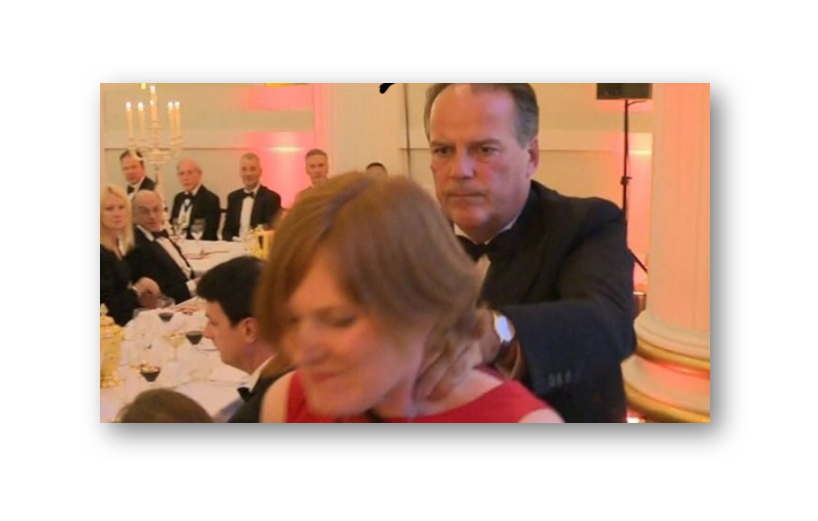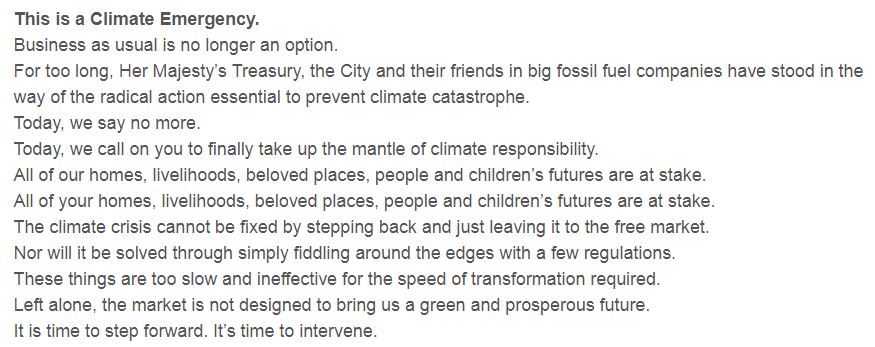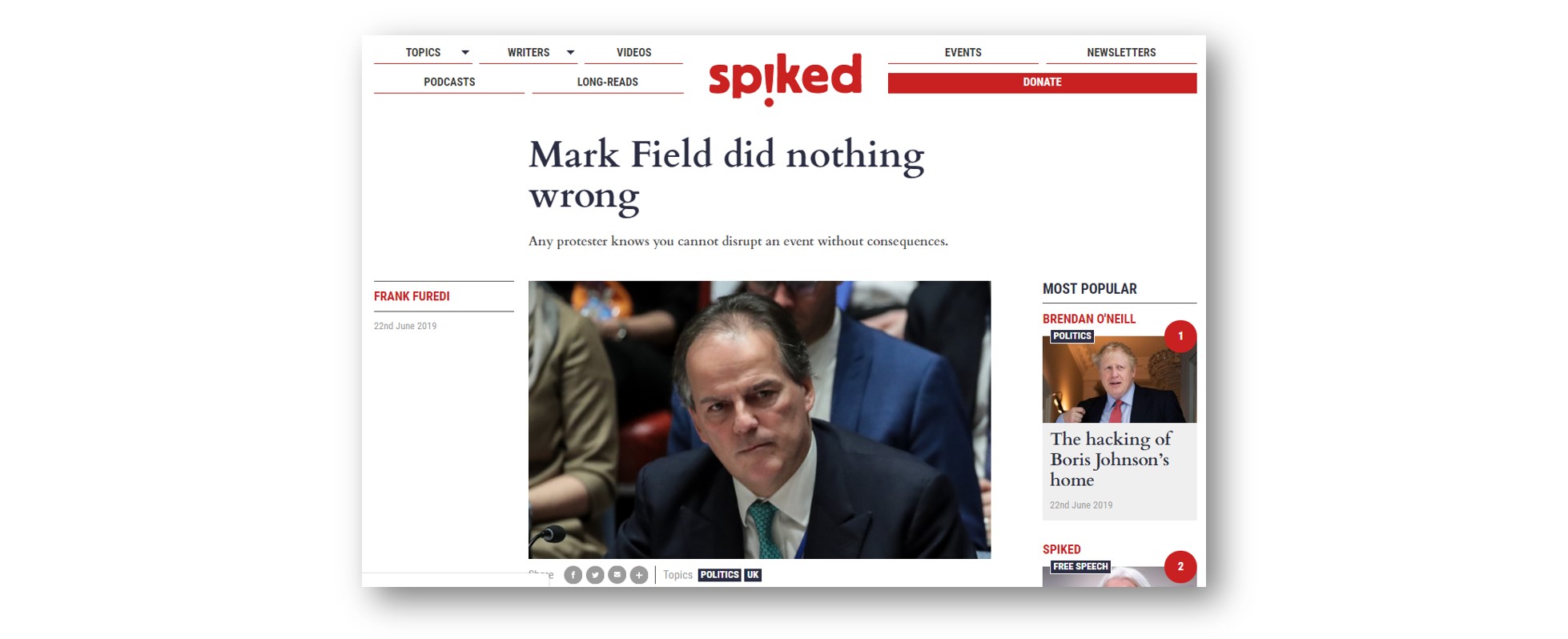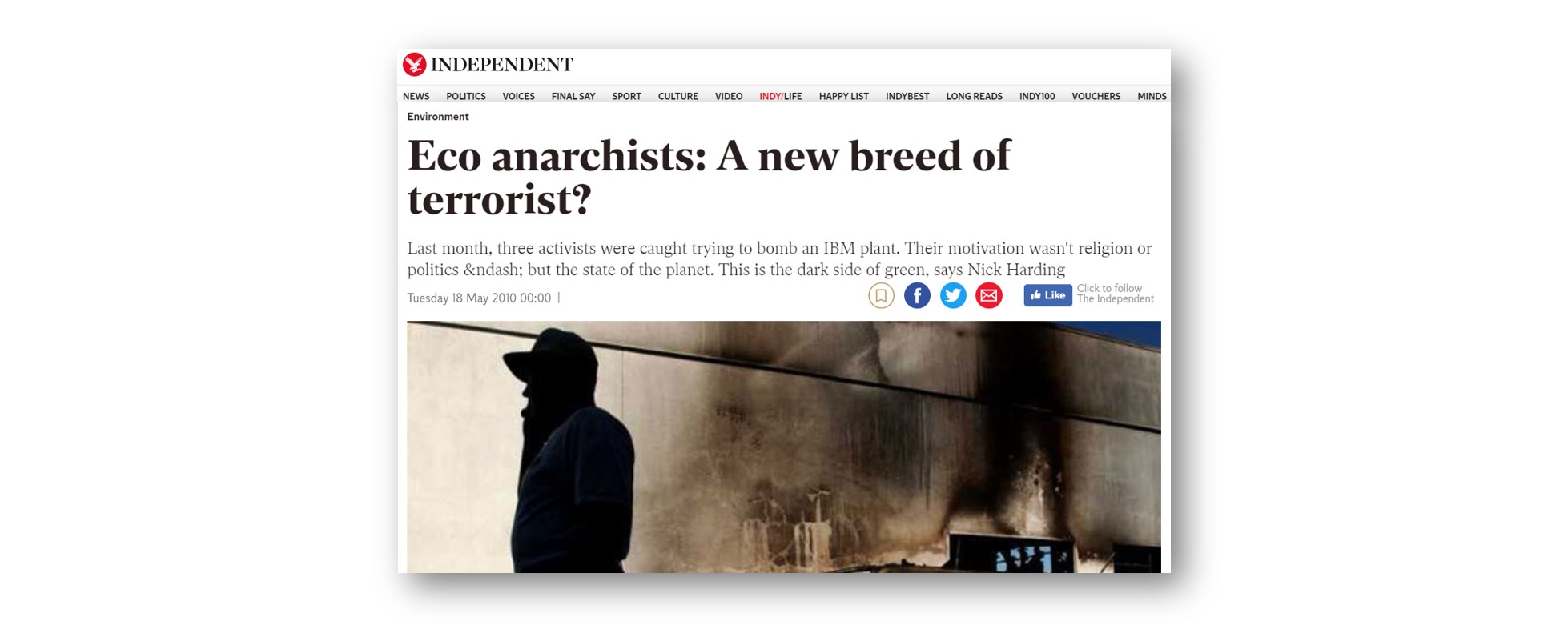After protests around the Newbury Bypass in the 1990s, Conservative minister John Watts famously claimed that he would like to see Swampy “buried in concrete”.
The descent of peaceful protest in Britain from being seen as an essential part of a democracy into a criminal act to be framed as a “threat” can be charted down the decades: from the Greenham Common Peace Camp in 1981, accelerating through the alternative culture of the traveling community in the Battle of the Beanfield in 1985, to the rave scene and road protests of the 1990s.
The phenomenon has more recently been charted by DeSmog and reached its apogee with the appalling Spycops scandal.
This is the background to Tory MP Mark Field’s violent removal of Greenpeace protestor Janet Barker at a plush Mansion House Dinner last week.
While the event has been (rightly) analysed by commentators as the epitome of elite rule and exceptionalism, much of the actual point of Greenpeace’s protest has been entirely missed.
In the deafening din of the media ‘moment’, protestors are acting as a sort of proxy for nervous Brexit Britain’s culture war as we hurtle backwards to an imagined 1950s.
But the reality is that Barker was one of forty peaceful protestors who read out an important message to the suited-and-booted diners. Not seen it? Quelle surprise.
It stated:
You can read the full statement here.
Phillip Hammond, who was the keynote speaker at the event, was targeted specifically because of his remark that we can’t afford to take the action needed to bring emissions down to zero. In other words, we “can’t afford” to take the action needed to safeguard the futures of our children and the people of the world.
That was the nonsense that was being targeted. And that is the message that has been somewhat lost – to the benefit of those challenging climate action, and the detriment of everyone else.
Questionable defence
The usual suspects lined up to denounce Greenpeace and defend Field’s action, despite it being described by one barrister as “clearly assault”.
The positive side effect (from their perspective) of this inflated culture war is that arguments of substance around climate action get lost beneath polemic about how men should be allowed to viciously take matters into their own hands – like in the good old days.
No surprise then that the guru of the Koch-funded Spiked website and libertarian defender of “free speech” Frank Furedi wrote: “I really do not understand why Mark Field was suspended as a Foreign Office minister for throwing out a female Greenpeace activist, Janet Barker, who ‘peacefully’ invaded and disrupted a private dinner. I also do not understand why Field bothered to apologise for doing what any responsible man or woman would have done in similar circumstances.”
Camilla Long over at The Times was also confused about the concept of peaceful protest, writing, “Mark Field may have behaved like an abusive git, but so did the selfish, shrieking eco protesters.”
She went on: “‘Peaceful’ is one of those trigger phrases. It apparently gives [Barker] moral licence to storm into any event and stop it in its tracks — it doesn’t matter if it’s a business gathering in Mansion House or your kitchen supper next Tuesday in Dulwich.”
Ross Clark over at the Telegraph wasn’t just bemused about the mode of defiance but also the motive behind protesting a climate crisis, writing:
“Why, in any case, would genuine environmentalists want to protest against a government which, alone in the world, has just committed Britain to reduce carbon emissions to net zero by 2050?”
“You would think they would be grateful. But no, they just carry on with the same silly old stunts.”
Clark then leaps to conclude: “Anyone can don a Greenpeace sash, as she was wearing. Field was completely right to remove her, as he did without causing her any injury. Failing to do so could so easily have proved fatal. We have already had one MP killed, Jo Cox.”
This is the main argument of Mark Field’s defenders: despite the fact that the protest had been under way for some time (as the longer video extract clearly shows), that Greenpeace have a long history of peaceful protest and direct action, and that Jo Cox’s killer was not an environmental protestor but a member of the far-right Britain First group, Barker was clearly a threat and therefore Field was right to act regardless of the nature of that action.
‘Environmental extremism’
This reaction – pleading ‘safety first’ – is the culmination of a long-term re-framing of legitimate protest as extremism.
The roots of this are many – but we should note two: the long-standing militarisation of the police and attacks on fossil fuel pipeline protestors and environmental defenders in the US, and the criminalisation of legitimate protest and the new surveillance tools being used against peaceful protesters in England.
Joey Mahmoud, executive vice president of Texas-based Energy Transfer Partners, the company behind the Dakota Access pipeline said the protest movement “induced individuals to break into and shut down pump stations on four operational pipelines. Had these actions been undertaken by foreign nationals, they could only be described as acts of terrorism.”
This conflation of protest with terrorism is neatly captured in the term “domestic extremist”, which has been used in police manuals for years.
But no one actually knows what the term means.
The Guardian reported in 2009 that there was no legal definition of domestic extremism. “Instead, the police have made a vague stab at what they think it means”, it said:
“Senior officers describe domestic extremists as individuals or groups ‘that carry out criminal acts of direct action in furtherance of a campaign’,” the Guardian reported. “These people and activities usually seek to prevent something from happening or to change legislation or domestic policy, but attempt to do so outside of the normal democratic process.”
Activists responded by “claiming this is an excuse that gives police the licence to carry out widespread surveillance of whole organisations that are a legitimate part of the democratic process”, the article reported. The Independent called the term “a label for radical environmental activism – a sort of terrorism-lite”.
As the realities of the “climate emergency” become more apparent, the need for legitimate protest becomes more urgent. In response, the powers that be will accelerate efforts to deride and criminalise the protestors, as the elite defend the indefensible and double down on business-as-usual practices we know lay at the heart of the climate crisis. And everybody loses.
Mike Small is the Founder and Editor of Bella Caledonia. He was DeSmog UK‘s Deputy Editor from March to December 2018, and continues to contribute to the publication.
Subscribe to our newsletter
Stay up to date with DeSmog news and alerts









